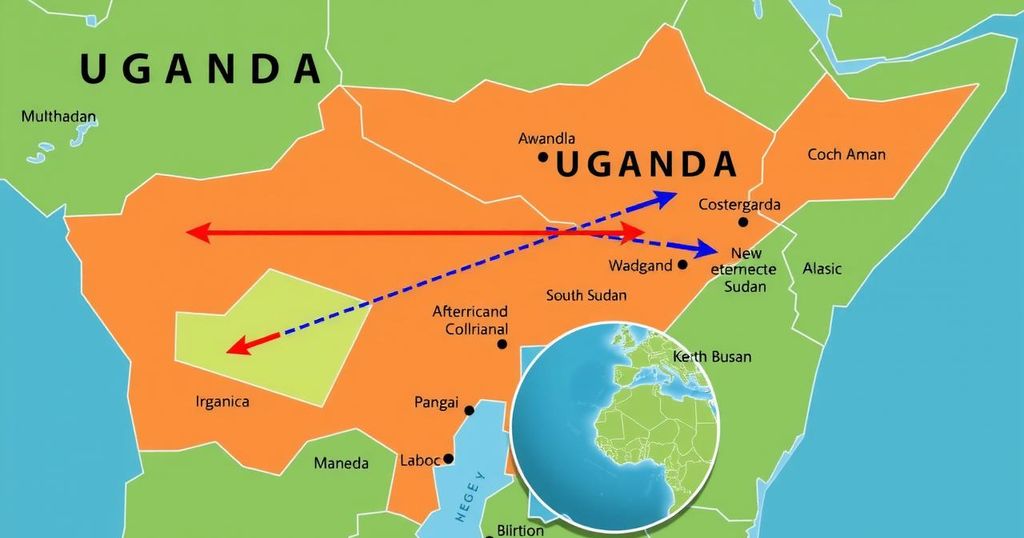Uganda’s involvement in South Sudan reflects serious issues regarding governance, trust, and military reliance. President Museveni’s support for Salva Kiir is viewed as detrimental to regional stability and South Sudan’s internal integrity. The reliance on Ugandan military assistance, coupled with perceptions of Uganda’s complicity in human rights violations, has eroded public trust among South Sudanese. Calls for Uganda to withdraw troops and support genuine peace negotiations are imperative for preserving sovereignty and fostering stability.
Uganda’s involvement in South Sudan has raised significant concerns regarding governance, trust, and the potential for escalating conflict. The recent ambiguity surrounding the deployment of Ugandan troops highlights the ongoing complexities and historical connections between the two nations. President Museveni’s support of South Sudan’s Salva Kiir appears to benefit the latter at the expense of regional stability and peace, garnering criticism for perpetuating unrest.
For South Sudan, the reliance on foreign military intervention compromises the integrity of its national army, diminishing its capability to manage internal conflicts. This dependence fosters an image of weakness, inviting external interference from neighboring countries that may seek to exploit its vulnerabilities. Consequently, South Sudan’s sovereignty is further undermined, and its struggle for internal peace becomes more complicated.
Although Uganda once represented solidarity during South Sudan’s liberation struggles, its support since 2013, characterized by military involvement that allegedly involves serious human rights abuses, has marred this relationship. Many South Sudanese now perceive Uganda not as an ally but as a supporter of a despotic regime disconnected from the populace’s needs, fostering resentment among ordinary citizens.
The dynamics of military involvement reveal a troubling pattern. When conflicts arise between Salva Kiir and Riek Machar, Ugandan military support is allegedly procured to suppress dissent. This behavior damages Uganda’s regional credibility and exacerbates existing tensions in South Sudan, undermining peacebuilding efforts and drawing in other regional players.
The Uganda People’s Defence Force (UPDF), once perceived as a respected military establishment, now risks being viewed as a mercenary force. These deployments not only tarnish its reputation but may also jeopardize international support for training and logistics, compromising UPDF’s effectiveness in an already unstable environment.
The broader international community must recognize Uganda’s entanglement in South Sudan’s domestic power struggles as counterproductive. It is vital for organizations such as the United Nations and the African Union to encourage Uganda to withdraw military forces and shift towards genuine peace efforts, while also urging South Sudanese citizens to resist external interference that threatens their sovereignty.
Rather than funneling substantial funds into military support from Uganda, the South Sudanese government should focus on strengthening its national military forces. True independence and stability can only be achieved through self-reliance and empowerment of the local populace.
The sentiment shared by many Ugandans towards South Sudan remains one of goodwill, rooted in a shared history of resilience and aspirations for self-determination. There is a widespread call for Ugandan leadership to reassess its foreign policy to avoid becoming an aggressor in the regional context, thus preserving a legacy of liberation rather than destruction.
As an elder statesman and a veteran of liberation, it would be a tragic irony for President Museveni to have participated in both the liberation and subsequent jeopardization of South Sudan, transforming freedom fighters into mercenaries for hire.
In conclusion, Uganda’s military presence in South Sudan is laden with complexities that threaten both nations’ stability. Continued support for an authoritarian regime undermines regional integrity and poses significant risks to South Sudan’s sovereignty. It is crucial that both nations refocus efforts towards mutual respect and genuine peace processes, ensuring that historical ties do not become sources of conflict. Ultimately, the hope lies in realizing a relationship built on solidarity rather than exploitation.
Original Source: www.independent.co.ug






